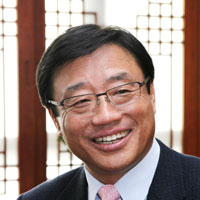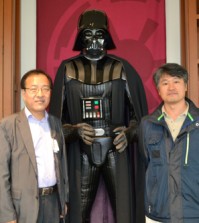- California Assembly OKs highest minimum wage in nation
- S. Korea unveils first graphic cigarette warnings
- US joins with South Korea, Japan in bid to deter North Korea
- LPGA golfer Chun In-gee finally back in action
- S. Korea won’t be top seed in final World Cup qualification round
- US men’s soccer misses 2nd straight Olympics
- US back on track in qualifying with 4-0 win over Guatemala
- High-intensity workout injuries spawn cottage industry
- CDC expands range of Zika mosquitoes into parts of Northeast
- Who knew? ‘The Walking Dead’ is helping families connect
KOTRA to support retailers’ global advance
By Kim Tae-gyu
LONDON — Oh Young-ho, chief of the state-run Korea Trade-Investment Promotion Agency (KOTRA), said his outfit will take steps to help Korean retailers and food makers to enter Europe and other advanced markets.
He made the remarks on the sidelines of the Taste of Korea event where Korean food is being offered at U.K. discount chain Tesco through next week.
Our foods are gaining popularity across the globe as demonstrated by the rapid growth of the annual Taste of Korea event in the United Kingdom, Oh said in an interview.
Our eventual vision is to help Korean retailers set up operations in places like the U.K. Then, our food manufacturers, including small ones, would make their presence felt in the international market more easily.
The Taste of Korea began here in 2011 at a single hypermarket of Tesco, the worlds second biggest supermarket chain after Walmart. The number of stores participating in the event has however jumped to 49 this year where some 100-tons of Korean foods are displayed.
The third edition of the annual show started on Nov. 4 and will continue through Nov. 17. In addition, Tesco sells products through its Internet mall, the largest online food mall in the world.
Oh cited three reasons that explain the rapid success of the event within such a short time span.
First of all, our companies developed foods suiting the tastes of foreign customers. And the efforts of contacting global distributors also worked. Finally, the hallyu or Korean wave was a shot in the arm, said the life-time bureaucrat who took charge of KOTRA in late 2011.
The Korean wave refers to the popularity of the Korean pop culture such as songs, movies and soap operas.
However, Korean retail giants such as Shinsegae and Lotte have been reluctant to make big bets on developed markets, which are dominated by global powerhouses like Walmart, Tesco and Carrefour.
In the face of the rapid saturation of the domestic market, they have become compelled to consider overseas markets. In the mean time, they have been mainly targeting developing nations like China and the Southeast Asian region.
Currently, our players seem to be pursuing a wait-and-see attitude in rich countries. However, as Korean foods continue to receive more attention, they need to explore business opportunities there. We will take all steps necessary to support them, Oh said.
Then, not only our conglomerates but also smaller companies in the food industry will more easily wade into foreign markets to create a win-win solution for both of them.













![일본 사도광산 [서경덕 교수 제공. 재판매 및 DB 금지]](http://www.koreatimesus.com/wp-content/uploads/2024/07/PYH2024072610800050400_P4-copy-120x134.jpg)


